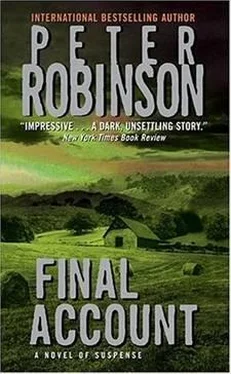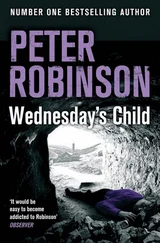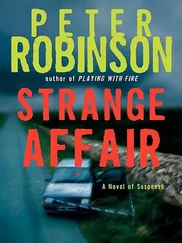Banks shook his head. “I’m afraid we’ll have to depend on the kindness of microchips.”
Blackstone scowled. “Hang on a minute.” He made a quick phone call and set the inquiry in motion. “They say it could take a while,” he said. “It might be a long list.”
Banks nodded. “What do you know about Tahiti?” he asked.
“ Tahiti? That’s where Captain Bligh’s men deserted in the film. It’s part of French Polynesia now, isn’t it?”
“I think so. It’s in the South Pacific at any rate. And Gauguin painted there.”
“Why are you interested?”
Banks told him what Melissa Clegg had said.
“Hmm,” said Blackstone. “It wouldn’t do any harm to put a few inquiries in motion, check on flights, would it? Especially now we’ve found the car at Heathrow. A relative newcomer might stand out there. I’ll see what I can do.”
“Thanks. Anything else?”
“We finished the house-to-house in Pamela Jeffreys’s street. Nothing really, except I think we’ve fixed the time. One neighbor remembered hearing some noise at about nine-fifteen Monday evening, which fits with what the doc said, and with Mr. Judd’s statement.”
Banks nodded.
“The people on the other side were out.”
“These neighbors,” said Banks, “they said they just heard some noise ?”
“Yes.”
“Ken, imagine how much noise it must have made when they smashed that stuff. Imagine how Pamela Jeffreys must have screamed for help when she realized what was happening.”
“I know, I know.” Blackstone shook his head and sighed. “I suppose they would have gagged her.”
“Still… ”
“Look, Alan, according to DC Hyatt, who talked to them, they said they thought it was the television at first. He asked them if she usually played her television set so loud, and they said no. Then they said they thought she was having a fight with her boyfriend. He asked them if that was a regular occurrence, too, and again they said no. Then they said, or implied, that dark-skinned people have odd forms of entertaining themselves and that we white folks had best leave them to it.”
“They really said that?”
Blackstone nodded. “Words to that effect. They’re the sort of people who wouldn’t cross the street to piss on an Asian if she was on fire. And they don’t want to get involved.”
“And that’s it?”
“Afraid so.” Blackstone looked at his watch. “I don’t know about you, but I’m a bit peckish. What do you say about lunch, on me?”
Banks didn’t feel especially hungry, but he knew he ought to try to eat something if he were to keep going all day. “All right, you’re on,” he said. “But no curries.”
The other shops were not much different from the first: usually with the windows barred or covered in mesh, and usually close to dilapidated, graffiti-scarred corporation estates or surviving pre-war terraces of back-to-backs in areas like Hunslet, Holbeck, Beeston and Kirkstall. One moment the sun was out, the next it looked like rain. Around and around they drove, Hatchley flipping through the A to Z , which had now become so well-thumbed that the pages were falling out, missing turnings, looking for obscure streets. It was all depressing enough to Susan, and a far cry from the nice big semi at the top of the hill in Sheffield where she grew up.
But Hatchley, she noticed, seemed to relish the task, even though after another three visits they had got nowhere. His reputation for laziness, she was beginning to realize, might be unfounded. He certainly didn’t like to waste energy, and usually took the line of least resistance, but he was hardly alone in that.
Susan had known truly lazy policemen – some of them had even made detective sergeant – but none of them were like Hatchley. They simply put in the time until the end of their shift, generally trying to stay out of the way of any situation that might generate paperwork. Hatchley was determined. When he was after something, he didn’t let go until he got it.
The fifth shop was larger and more modern than the others, a kind of mini-market-cum-off-license that sold milk, tinned foods, bread and all sorts of odds and ends as well as booze, newspapers and magazines. It was on Beeston Road, not far from Elland Road, where Leeds United played, and it was run, Hatchley said, by a man called Mario Nelson, who, as his name suggested, had an Italian mother and an English father.
It was immediately clear to Susan that Mario took after his father. She knew there were blond-haired Italians in the north of the country, but they didn’t look as downright Nordic as Mario. Tall, slim, wearing a white smock, he looked far too elegant to be running a shop. In his early fifties, Susan guessed, he was handsome in a Robert Redford sort of way, and he looked as if he would be more comfortable being interviewed on a film set than unpacking a box of mushroom soup, which is what he was doing when they entered. When he saw Hatchley, a look of caution came to his ice-blue eyes. There was nobody else in the shop.
“Mario, old mate,” said Hatchley. “Long time no see.”
“Not long enough for me,” muttered Mario, putting the box aside. “What can I do for you?”
“No need to be so surly. How’s business?” Hatchley took out a cigarette and lit up.
“There’s no smoking in here.”
Hatchley ignored him. “I asked how’s business?”
Mario stared at him for a moment, then broke off eye contact. “Fair to middling.”
“Doing much special trade?”
“Don’t know what you mean. Look, if you’ve just come to chat, I’m a busy man.”
Hatchley looked exaggeratedly around the shop. “Doesn’t look that way to me, Mario.”
“There’s more to running a shop than serving customers.”
“Well, soon as you’ve answered our questions, you can get back to it.” He described the man in the balaclava. “Ever seen anyone like that in here? Is he on your list?”
“It’s a bit of a vague description.”
“True, but concentrate on the eyes. They’d just about come up to your chin. Poor misguided bloke has an appetite for shaved pussy magazines, and I know you supply them.”
“You’ve never proved that.”
“Come off it! The only reason you’re still in business is that you’ve done me a few favors over the years. Remember that. You’re a filth-peddler. You know I don’t like filth-peddlers, Mario. You know I rank them a bit below a dollop of dog-shit on my shoe.”
Hatchley made some very interesting distinctions, Susan thought, some delicate moral judgments. Simple display of naked flesh was fine with him, obviously, but anything more was pornographic. Bit of a puritan, really, when it came down to it.
She watched Mario shift from foot to foot, and she saw something in his eyes other than wariness; she saw that he recognized Hatchley’s description, or thought he did. Hatchley noticed it, too. And she saw fear.
Hatchley dropped his cigarette on the floor and ground it out. “Susan,” he said, “would you go put up the ‘Closed’ sign, please?”
“You can’t do that,” said Mario, coming out from behind the counter and moving to stop Susan. Hatchley got in the way. He was about the same height and two stones heavier. Mario stopped. Susan went to the door and turned the sign over.
“Might as well drop the latch and pull the blinds down, too,” said Hatchley, “seeing as it’s such a quiet time.”
Susan did as he said.
“Right.” Hatchley turned to face Mario. “What’s his name?”
“Whose name? I don’t know what you’re on about.”
“We’re not gormless, Susan and I. We’re detectives. That means we detect. And I detect that you’re lying. What’s his name?”
Читать дальше












